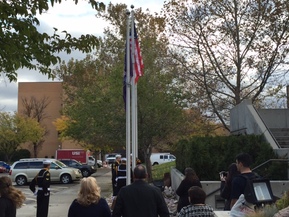
The congressional district in which I live, Utah's 3d congressional district, is a Republican majority district. I ran as an independent in the 2014 election. Voter turnout for that election was a dismal 38 percent of registered voters. That means that the percentage of eligible citizens who voted was even lower than 38 percent. The candidate who won that election, Republican Jason Chaffetz, won his seat in Congress with positive votes from only 27 percent of the registered voters in our district. There are Democratic majority districts where the situation favors Democrats in precisely the same way. Regardless of where you stand on the political spectrum, it is, I think, obvious that a situation where more than 60 percent of the registered voters in a congressional district are effectively disenfranchised is a threat to our republic. History teaches that such environments are the breeding ground of tyrants. Hitler's Nazi party came to power when gridlock forced Hindenburg'g government to include the Nazis in a coalition.
As members of the Armed Forces, veterans took an oath to support and defend the Constitution against all enemies, foreign and domestic. Even though the current partisan landscape is not the product of any deliberate activity, at least not in the sense of some grand conspiracy, it is still a threat to our republic. Veterans are the ideal group to respond to this threat, and I believe it is important they do so.
In the armed forces, service members learn to work together for the common good regardless of differences of background, religion or political philosophy. Veterans know that, with the right kind of leadership, it is possible to subordinate parochial interests to accomplish a unified mission. This is precisely the message that veterans can bring to our national political dialogue. By virtue of their service, veterans have a certain credibility as candidates as well. Here is a population of people who have demonstrated by their actions that they are willing to put country in front of self--an ethos sorely absent in many career politicians. Stepping up to run for office is one more opportunity for veterans to support the constitutional processes that make America great. We should encourage veterans to embrace this challenge, especially in districts where a majority party monopoly deprives voters of credible opposition candidates.
Running for office may seem too big a project, but it does not have to be. In 2014, there were no declared opposition candidates in my district until eight months before the election. In districts where there would otherwise be no credible opposition candidates, a veteran running against the majority party can determine the scope of their campaign. In my 2014 race, I decided not to take political contributions, for instance, and I chose where and when to campaign. I maintained 100 percent control of my messaging and themes. In 2016, veteran candidates could determine the scope and intensity of their campaigns in accordance with their own personal circumstances. Such an approach may make victory seem like a long shot, but it is far better for all of us to have a credible opposition candidate on the ballot than to allow a situation where voters essentially have no choice but to vote for the majority candidate or not vote at all. There is still time for veteran candidates to mount a campaign for 2016. Those of us living in districts dominated by one party or the other should find a veteran willing to run for the opposition. For veteran candidates, providing a credible alternative to the majority party is one more opportunity to serve.

 RSS Feed
RSS Feed
